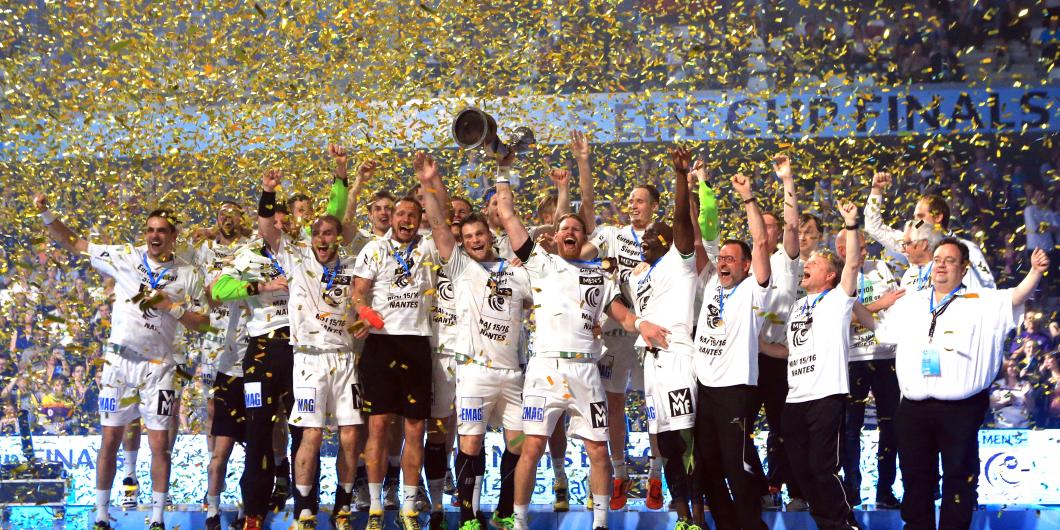“This competition will be the ladder for those aiming for the Champions League, a perfect product to develop on sporting and organisational ground.” EHF President Jean Brihault said, prior to the start of a new-look club competition in European handball. And nobody was to be disappointed.
Based on a decision of the EHF Executive from 8/9 April 2011, the Men’s EHF Cup and Cup Winners’ Cup were merged from the start of the 2012/13 season. German side SG Flensburg-Handewitt made history by becoming the last Cup Winners’ Cup winners in May 2012.
The new competition included top sides from all over Europe, and the playing system was changed with the implementation of the group phase following three qualifications rounds. Quarter-finals then decided the four participants of the EHF Cup Finals, which would be played in a final-four format, similar to the VELUX EHF FINAL4.
In the first season, 75 clubs were part of the maiden voyage of the newly merged EHF Cup. And several applicants wanted to host the EHF Cup Finals. In December 2012, the EHF announced the hosts - and the winner was….Nantes.
Thrilling encounters in the qualification and the group phase in full arenas were the proof that the decision to change the playing system was absolutely correct.
Nantes host first edition of EHF Cup Finals
The defending EHF Cup champions (old format) Frisch Auf Göppingen, Rhein Neckar Löwen (both Germany), Team Tvis Holstebro (DEN) and host HBC Nantes qualified for the first ever EHF Cup Finals. More than 5000 fans per day enjoyed great handball in the Palais des Sport de Beaulieu.
“The organisation of this event was a big challenge for us, in our second year of participation in the EHF Cup, we continued to learn in the field of event organisation, so this first edition of the EHF Cup Finals responded to our desire to learn together with the EHF”, Gaël Pelletier, President of HBC Nantes, said, looking back.
Finally nearly all dreams of the organisers came true - except the fact that they lost the final against Rhein Neckar Löwen.
“It was magic on and off of the court. It was a beautiful event with 10,000 spectators in two days and a brilliant champion at the end of the weekend”, said Pelletier, adding: “During the final, the arena was shaken to its foundations by the fans. At the end, we were gifted by many years of learning in the field of organisation in just a few months.”
Like his fellow countryman, Brihault, Pelletier is sure that the premiere of the event was the perfect start to the second major European club competition below the VELUX EHF Champions League.
HBC coach Thierry Anti shares those great memories: “We were so proud to participate in the EHF Cup Finals at home and for me personally it was a pleasure to play a new European Cup final after so many years.
“We fought until the end with the support from our extraordinary fans, it was really a big final! Unfortunately, it was also a big disappointment, but Rhein Neckar Löwen were stronger and deserved this victory. But still, this game stayed is a beautiful memory,” he said.
EHF Cup: an opportunity to learn and develop
In all seasons since the start in 2012/13, all EHF Cup Finals hosts have been part of the competition, though there is a possibility of neutral cities, clubs or arenas to bid for hosting the event.
In the two following seasons, the EHF Cup Finals were carried out in Berlin, both organised by the Füchse club, which in 2015 became the first hosts to win the trophy.
One year earlier, the Foxes had failed in the semi-finals against Montpellier, while one day later, Pick Szeged became the first ever Hungarian club to win the competition (in both the old and the new formats).
In May 2016, the EHF Cup Finals returned to where it all had started - Nantes - where the hosts again missed out on the chance of raising the trophy, this time beaten by Göppingen. Despite this result, Pelletier is still grateful: “Thanks to the trust of the EHF we had learned so much in 2013, and it was a pleasure to cooperate a second time in 2016.”
As the merging of both competitions in men’s handball had been such a huge success, the Women’s EHF Cup was merged with the start of the 2016/17 season.
And HBC Nantes? They did not only learn in terms of organisation, but also improved on a performance level. 2016/17 marks another milestone for Pelletier, Anti & Co., as they have qualified for the VELUX EHF Champions League for the first time.
A perfect example of what Brihault meant by 'climbing the ladder'.


